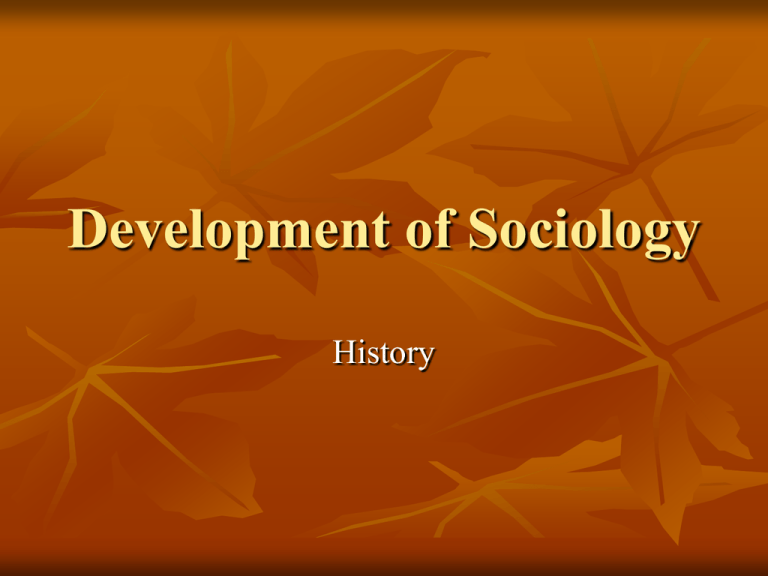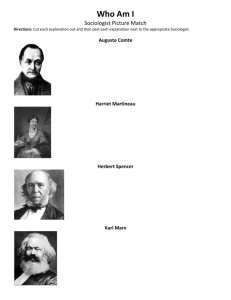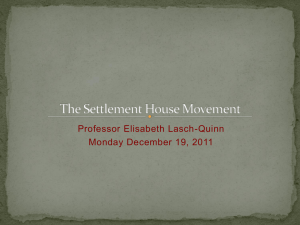PPT
advertisement

Development of Sociology History Separate study develops in the 1800”s 1. rapid changes and the industrial revolution 2. growth of urban population (housing shortages, crime, pollution) 3. individual vs group European scholars Isidore Auguste Marie François Xavier Comte (19 January 1798 – 5 September 1857), was a French philosopher. He was a founder of the discipline of sociology and of the doctrine of positivism. He may be regarded as the first philosopher of science in the modern sense of the term. Harriet Martineau (12 June 1802 – 27 June 1876) was an English social theorist and Whig writer, often cited as the first female sociologist. Martineau wrote 35 books and a multitude of essays from a sociological, holistic, religious, domestic, and, perhaps most controversial, a feminine perspective Herbert Spencer 1820—1903 He was one of the principal proponents of evolutionary theory in the mid nineteenth century, and his reputation at the time rivaled that of Charles Darwin. Spencer was initially best known for developing and applying evolutionary theory to philosophy, psychology and the study of society — what he called his “synthetic philosophy” Spencer is best known for coining the concept “survival of the fittest", Karl Marx 1818-1883 Emphasize the primary role that conflict plays in the social change and advocated revolution to speed up the process of change his ideas led to the development of the conflict perspective in sociology Emile Durkheim 1858-1917 Described society as a set of interdependent parts, with each part serving a specific function; believed that sociologist should focus on observable social phenomena, influential in developing the functionalist perspective in sociology. Much of Durkheim's work was concerned with how societies could maintain their integrity and coherence in modernity; an era in which traditional social and religious ties are no longer assumed, and in which new social institutions have come into being. Max Weber Developed the concept of ideal type against which the social reality can be measured; sociology should should attempt to understand the meanings that individuals attach to their actions. Interactionist perspective in sociology Americans Sociology dept at University of Chicago Chicago School- group interactions and the impact of society on individual development Practical solutions to social problems- Jane Addams (1860-1935) Considered a social worker Jane Addams worked with the Civic Federation of Chicago to address social and political problems was a pioneer settlement worker, founder of Hull House in Chicago, public philosopher, sociologist, author, leader in woman suffrage and world peace. Settlement house The settlement movement was a reformist social movement, beginning in the 1880s and peaking around the 1920s in England and the US, with a goal of getting the rich and poor in society to live more closely together in an interdependent community. Its main object was the establishment of "settlement houses" in poor urban areas, in which volunteer middle-class "settlement workers" would live, hoping to share knowledge and culture with, and alleviate the poverty of their low-income neighbors Hull House Addams and Starr were the first two occupants of the house, which would later become the residence of about twenty-five women. At its height, Hull House was visited each week by around two thousand people. Its facilities included a night school for adults, kindergarten classes, clubs for older children, a public kitchen, an art gallery, a coffeehouse, a gym, a girls' club, a bathhouse, a book bindery, a music school, a drama group, and a library, as well as laborrelated divisions. Her adult night school was a forerunner of the continuing education classes offered by many universities today. Smith Hall Women’s Club Hull House In addition to making available social services and cultural events for the largely immigrant population of the neighborhood, Hull House afforded an opportunity for young social workers to acquire training. Eventually, Hull House became a thirteen-building settlement complex, which included a playground and a summer camp (known as Bowen Country Club). W.E.B. Dubois 1868-1963 Used community studies to underscore the significance of race in American society; believed that sociologists should be involved in social reform as well as academic study NAACP











